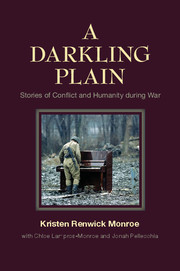Book contents
- Frontmatter
- Epigraph
- Contents
- Preface
- Introduction
- Part one War is a Terrible Thing!
- 1 Constructing an Analysis of the Unspeakable
- Part Two Guarding One’s Humanity During War: World War II
- Part Three Other Voices, Other Wars: From Indochina to Iraq
- Part Four Civil Wars and Genocides, Dictators and Domestic Oppressors
- Part Five My Story, Your Choice How to Use it
- Conclusion
- Bibliography
- Acknowledgments by the Senior Author
- Index
- References
1 - Constructing an Analysis of the Unspeakable
Literature, Methodology, and Data
Published online by Cambridge University Press: 05 October 2014
- Frontmatter
- Epigraph
- Contents
- Preface
- Introduction
- Part one War is a Terrible Thing!
- 1 Constructing an Analysis of the Unspeakable
- Part Two Guarding One’s Humanity During War: World War II
- Part Three Other Voices, Other Wars: From Indochina to Iraq
- Part Four Civil Wars and Genocides, Dictators and Domestic Oppressors
- Part Five My Story, Your Choice How to Use it
- Conclusion
- Bibliography
- Acknowledgments by the Senior Author
- Index
- References
Summary
Introduction
There is little doubt about the negative impact of war on the human psyche. But what do we know about the ability to recover from the trauma of war, to heal wounds and flourish as we construct a meaningful life? Playwrights, poets, biographers, and writers of fiction often provide revealing insights into war, asking how to best protect and draw forth humanity during war, and suggesting what does this best. Indeed, how people deal with the moral choices such catastrophes present and how people manage to cling to their humanity – if they do – constitutes a familiar theme in great literature. Sophocles’ Antigone and the updated version presented in Nazi-occupied France during World War II by Jean Anouilh, the eighth-century BCE Iliad and the Odyssey, Leo Tolstoy's War and Peace, John Steinbeck's The Moon is Down, Arthur Koestler's Arrival and Departure, and Steven Galloway's The Cellist of Sarajevo are but a few illustrations of literary treatments touching on this issue. Biographies and autobiographies abound with such themes. Christabel Bielenburg's Once I Was a German, Albert Speer's autobiography and Gitta Sereny's counterbiography, as well as fictionalized biographies, such as Elie Wiesel's Night or Tom Keneally's Schindler's List, all illustrate this genre's recent treatment of moral choice during war, in this instance World War II. Hollywood, too, frequently features issues of moral choice and humanity during war, in films such as Casablanca, Life is Beautiful, The Deerhunter, Coming Home, and The Hurt Locker, to mention just a few.
Surprisingly, it is the political science literature that is lacking, with philosophical literature equally sparse. Psychologists address the topic in a variety of ways. Social psychologists note the importance of both personality and the environment. Researchers on post-traumatic stress disorder highlight factors from positive beliefs about the world and control to a sense of agency, and the hardiness literature emphasizes the importance of not remaining isolated and the desire to participate in and learn from new experiences.
- Type
- Chapter
- Information
- A Darkling PlainStories of Conflict and Humanity during War, pp. 11 - 36Publisher: Cambridge University PressPrint publication year: 2014

